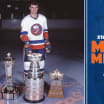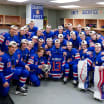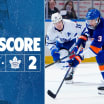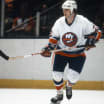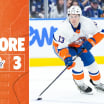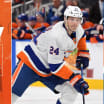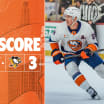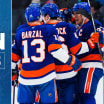Having helped launch the Islanders telecasts during the 1974-75 homestretch, I was overwhelmingly enthused about the club's chances to earn its first playoff berth.
It's March 1975 and -- WOW - Bill Torrey's team actually is in contention for its post-season berth. This was most certainly exciting stuff as was the entire 1974-75 season. But, as I clearly recall, it didn't happen by accident.
This was an attention-getting hockey club with young aces such as Denis Potvin, Clark Gillies and Bill Smith. Getting to the playoffs would be a challenge but this club had grown from its painful 1972-73 campaign; big-time.
Maven's Memories: The Road To The First Playoff
Stan Fischler details how the Islanders qualified for their first playoff appearance in 1975
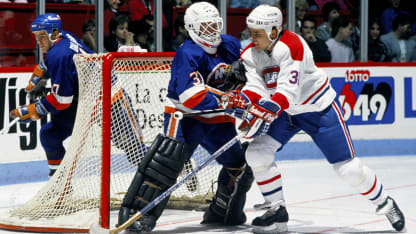
© Denis Brodeur/Getty Images
By
Stan Fischler
Special to NHL.com
As a matter of fact, I specifically remember part of the change and it all started with a quote:
"Last season they fixed up their goals-against by about 100 over the previous season. This year their offense appears much better. They've got some guys with good size who move well."
The words were not uttered by an Islanders' press agent in a moment of high glee, but by the Montreal Canadiens' Hall of Fame coach Scotty Bowman, one of the most respected analysts in the NHL.
Bowman watched in amazement as the Islanders opened the 1974-75 season -- the third for owner Roy Boe's squad -- at Montreal's revered Forum and extended the Canadiens to a 5-5 tie.
Even more impressive was that the Islanders had nursed a 5-3 lead over the vaunted Habs with less than two minutes remaining before losing the lead. When the team returned to Uniondale for their home opener on October 12, 1974 they romped over the Kansas City Scouts, 6-2.
Three nights later they scored six again; this time against the Canadiens for a final tally, 6-3. The Islanders' sudden ascendancy became the talk of the hockey world. By the end of October they had bombed the California Golden Seals, 10-1, shut out the Minnesota North Stars, 4-0, and were in first place.
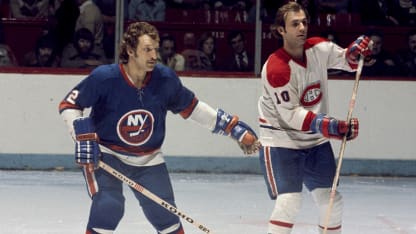
© Denis Brodeur/Getty Images
Even the mighty Philadelphia Flyers began to worry about the Islanders and they manifested their concern by playing their good-luck record of then famed vocalist Kate Smith singing "God Bless America" before the November 3, 1974 game at the Spectrum.
The combination was too much for coach Al Arbour's troops who lost, 3-1 to the Broad Street Bullies. Nevertheless, the Islanders came away from the Spectrum with still more raves; this time from Philadelphia coach Fred Shero:
"I'm more impressed with the Islanders than the Rangers," said Shero. "The Islanders are more disciplined. And they seem to be hungrier than the Rangers. As long as they continue to be hungrier than the Rangers, as long as they continue to show such enthusiasm and drive, they're going to give a lot of clubs plenty of trouble."
It was evident that the managerial-coaching team of Bill Torrey and Arbour was blending splendidly. Both agreed that the Islanders would continue to place the accent on youth -- and defense.
"The first job," said Torrey, "of every inexperienced team is to cut down on the goals allowed. A lot of people think this has to do with a goalie and defensemen, but the way the forwards play is just as important."
"They have to do their part in back checking and covering their positions when the pressure on the defense is too great. Then, when a team gets its goals-allowed level down to where it belongs, you can start building more offense."
The proof was in the standings. Although they didn't remain league leaders, the Islanders had definitely established themselves as a playoff threat for the first time in their brief NHL life.
By the midpoint of the 1974-75 season Arbour's skaters displayed a marked improvement over the previous year. After the same number of games (44) they had 34 points in 1974-75 compared with 12 the previous season. Their goals-against total dropped a significant 14 percent while the goals-for total zoomed up 37 percent.
Torrey still was not content with the results. He wanted more oomph up front and went to the NHL marketplace in search of scorers. To his amazement he learned that Minnesota North Stars Manager Jack Gordon was prepared to unload two crafty forwards with superb scoring credentials, J.P. Parise and Jude Drouin.
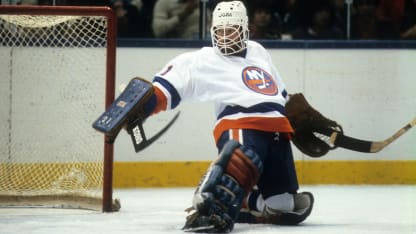
© B Bennett/Getty Images
In return, Gordon was willing to accept Ernie Hicke, Doug Rombough and Craig Cameron, a trio of forwards who had made only a minimal contribution to the Islanders' cause.
During an Islanders alumni reunion last winter, hosted by co-owner Jon Ledecky, Drouin told me he was stunned by the deal.
"J.P. and I were pretty good hockey players and we thought Bill (Torrey) really got the better of that deal," Drouin said."We were delighted to come to the Island because we saw so much potential in the young team."
Sure enough, that potential was rapidly being realized. For the first time in franchise history, the Nassaumen had become formidable foes; possibly even a playoff team.
Finally, after staying neck-and-neck with the Rangers and Atlanta Flames throughout the season, the Isles' playoff hopes hinged on the outcome of an April 4th contest between the Blueshirts and Flames.
Down in Atlanta, Emile Francis' Rangers looked destined to crash and burn as they fell behind, 2-0, in the first period. But, as New York Times reporter Parton Keese noted, the Blueshirts soon would do the Isles a great, big favor.
"The Flames, who had to win to stay alive, while the Rangers did not have to, jumped to a 2-0 lead in the first period, exhibiting a better sustained offense and close-checking defense.
"Then it became the Rangers who were the desperate team. In less than a half-minute of the third period, Jean Ratelle scored a goal to finish off a power-play that had begun before the intermission.
In less than two minutes, Rick Middleton blasted a 35-footer past (Phil) Myre to tie the game, and with the Rangers still pressing, Derek Sanderson tallied the game-winner with less than five minutes left."
The Blueshirts' come-from-behind victory had far-reaching playoff implications. For starters, their win clinched the Rangers a playoff spot.
More importantly, it catapulted the Islanders into a post-season berth -- the first in franchise history. With the elusive target finally secured, the Islanders had one more challenge to meet.
"It put the onus on the Islanders in the New York teams' struggle for second place in the division," wrote Keese. "With the Rangers leading by two points, 88 to 86, the Islanders must tie or defeat the Philadelphia Flyers tomorrow night at Nassau Coliseum to have a chance at second place and the home-ice advantage in the playoffs."
That advantage did not take place for the Islanders but, from my personal -- call it selfish, if you will -- viewpoint, home ice didn't matter. What mattered was that a new career was about to unfold for The Maven.
The Isles playoff run meant that I now was moving hellbent, from primarily the print journalism business to the tv side. That saga actually had begun months earlier. In a nutshell, from my view, I'd have to call it beginner's luck.
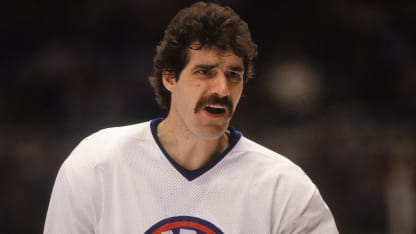
© B Bennett/Getty Images
During the 1974-75 season, I was doing "color" for the WHA's New England Whalers. In mid-March I happened to be in Toronto preparing.for a Whalers-Toros game when legendary New York broadcaster Marty Glickman phoned.
"How'd you like to broadcast an Islanders game?" Marty wondered.
At first I figured I was hallucinating and asked Glickman to repeat his previous question; which he did.
After a few gulps, I said, sure, I'd love to do Islanders tv and he then explained the brains behind this ground-breaking development -- someone I never had heard of at the time but would in good time.
Charles (Chuck) Dolan.
Glickman explained that Chuck was his pal and had some creative ideas in the world of cable. Only trouble was that at that time I had no idea what "cable" was all about.
But I listened to Marty and he lined me up with Dolan and, almost overnight, I was sitting in the broadcasters booth with Spencer Ross who would do the play-by-play.
The Islanders tied Atlanta that night and -- as I mentioned above -- had to thank the Rangers for next knocking off the Flames and putting the Arbour-men into the post-season for the first time.
For many fans, just the fact that the Islanders were at last "in" was cause enough for jubilation.
But I vividly recall that many of the Faithful wanted more; that is an unlikely first-round win over the Blueshirts from Broadway.
(NEXT WEEK: THE MELODRAMATIC MOMENTS PRECEDING THE FIRST ISLANDERS-RANGERS PLAYOFF)
LISTS: SIX MAJOR HEROES OF THE FIRST PLAYOFF SEASON:
1. AL ARBOUR:Radar had become an impressive leader with a troupe that gladly followed his baton. With his accent on defense, the likable -- but tough -- bench boss crafted a team that boasted vim, vigor and vitality; three ingredients for a winner.
2. BILL TORREY:Bow Tie Bill's wheeling, dealing and drafting had rapidly produced a well-balanced third-year club from the Bill Smith-Glenn Resch goaltending tandem to solid defenders and a respectable offense. Torrey's deal with Minnesota that brought J.P. Parise and Jude Drouin to Long Island would prove memorable, particularly in the first playoff round.
3. DENIS POTVIN:After surviving a bumpy -- yet impressive -- drive down Rookie Road, big Number Five deleted anything resembling a sophomore slump. As Torrey had hoped, the super-confident French-Canadian rapidly developed into the club's franchise foundation.
4. SHOCK TROOPS: Torrey's little-known Expansion Draft picks became known to the hockey trade as "Honest Blockers." Primary among them were Bob Nystrom, Garry Howatt and Lorne Henning. Howatt -- I nicknamed him "The Toy Bulldog" -- was a little guy who'd fight anyone twice his size.
5. THE BEST 1974 DRAFT PICK: Although he was selected fourth overall in the Isles third year draft, left wing Clark Gillies proved a lot better than Greg Joly, Wilf Paiement and Rick Hampton above him. The 20-year-old scored 25 goals and added 22 assists as a rookie, skating in all 80 games. Of the first 18 choices only the man called "Jethro" earned his way into the Hockey Hall of Fame.
6. GOALTENDING:The 24-year-old Smith was the winning netminder 21 times that season for the Islanders, appearing in what turned out to be a career-high 58 games. Meanwhile, the two-years-older Resch, who had just two career NHL games to his credit, both from the previous season, proved to be the perfect backup for Smith. He appeared in 25 games, winning 12. Both goalies earned three shutouts.

